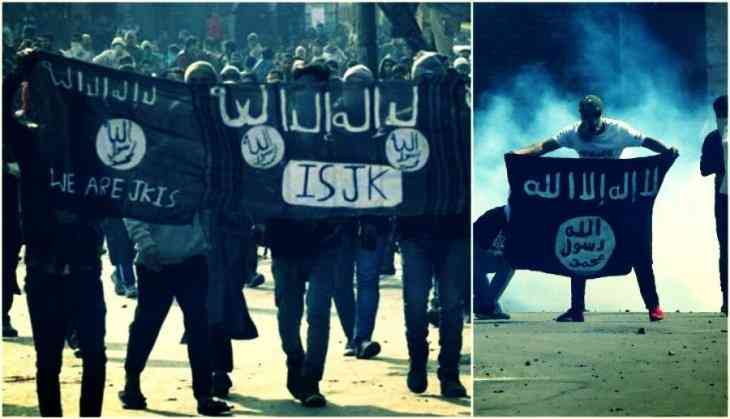
On May 9, security forces killed Ishfaq Ahmad Sofi in South Kashmir town of Shopian. It soon turned out Sofi was not just another militant fighting New Delhi in the state. He was owned by the global jihadi outfit Islamic State which claimed Kashmir as its new Wilayah (province). In a statement published in Amaq news agency, the IS claimed to have inflicted casualties on the forces at Amshipora, the site of the encounter that killed Sofi.
Sofi had joined Harkat-ul Mujahideen (HuM) in 2015, but had reportedly become a member of ISJK in 2016. The J&K Police has promptly denied that the IS even existed in the Valley with the DGP Dilbagh Singh terming claims of its presence in the state as "rubbish". In fact, the sources in the police say "there is no connection between the IS in KashmIr and the global outfit". And Sofi is said to be the last of the local IS member. Another member, police say, has joined the indigenous militant group Hizbul Mujahedeen.
But what then explains the global IS owning Sofi and claiming Kashmir as its Wilayah in Amaq, its recognised news agency? There is no credible answer to the question. But the police in Kashmir doesn't set much store by these claims.
"You can't verify these claims. But what you can verify is the situation on the ground in Kashmir," says a police officer. "And that situation tells us there is no IS presence in the Valley".
However, it is not first time that an international jihadi group has claimed to have a presence in Kashmir. In July 2017 for the first time since the outbreak of militancy in Kashmir in 1989, Al Qaeda announced to have set up its affiliate in Kashmir with former Hizbul Mujahideen Zakir Musa commander as its chief. The affiliate’s name is Ansar Ghazwat-ul-Hind.
The announcement was made by Global Islamic Media Front, a media wing of Al Qaeda. Giving the statement an imprimatur of authenticity, it also carried the logo of the official media Ansar Ghazwat-ul-Hind titled Al-Hur, Al-Hur. But ever since Ghazwat-ul-Hind has largely been absent from the Valley's militant discourse. And over the past year, the occasional feeble discourse around the Al Qaeda has given way to the one about the IS and almost in a similar fashion. And if the police is to be believed, the outfit has been all but wiped out with the killing of Sofi, its solitary militant.
Separatist Dissociation
Despite this ground reality, both Al Qaeda and the IS have recurrently sprung to the surface of the discourse about the situation in the Valley. More so, when both the separatist political and armed groups have dissociated from the the IS and made it clear that there was no role for an international jihadi group in Kashmir.
Earlier this year, after some masked youth unfurled an IS flag at the grand mosque in downtown Srinagar, separatist parties publicly took the group on by holding a protest jointly with civil society and trade bodies.
"All of us need to stand up and defeat the elements which are trying to malign our struggle,” Hurriyat M chairman Mirwaiz Umar Farooq said at the time. Not only has the incident saddened the people of Kashmir, but there is a growing demand for isolating these elements (IS supporters)”.
In fact Mirwaiz also performed 'purification' of the mosque after the incident.
So, does the IS operate in a vacuum in Kashmir? Or can it boast of some popular backing? "In a sense, one can say it operates in a vacuum. Separatists have distanced from it and the government has denied its presence," says Naseer Ahmad, author of Kashmir Pending. "But there is a tiny section of population which is a bit hardcore in their religious worldview. They may or may not be the IS supporters. But then people with extreme views exist in every society".
Pakistan Factor
Another important factor that rules out the scope for an IS or for that matter even Al Qaeda foothold in Kashmir is that it will never be supported by Pakistan.
Kashmir, it is argued, poses structural difficulties for an Al Qaeda or ISIS like outfit to operate and survive.
"No political or militant outfit in Kashmir can hope to exist in Kashmir without either leaning on Islamabad or New Delhi for support. The bottomline is there is no independent political or militant space in Kashmir. It will be very difficult to strike on your own and get away with it,” said a political analyst, not wishing to be named. “Basic questions to be asked are these: Who will fund an IS or Al Qaeda in Kashmir? Who will supply weapons? You cannot take on both India and Pakistan in Kashmir and also the rival militant outfits and then hope to survive”.
First published: 19 May 2019, 10:44 IST

